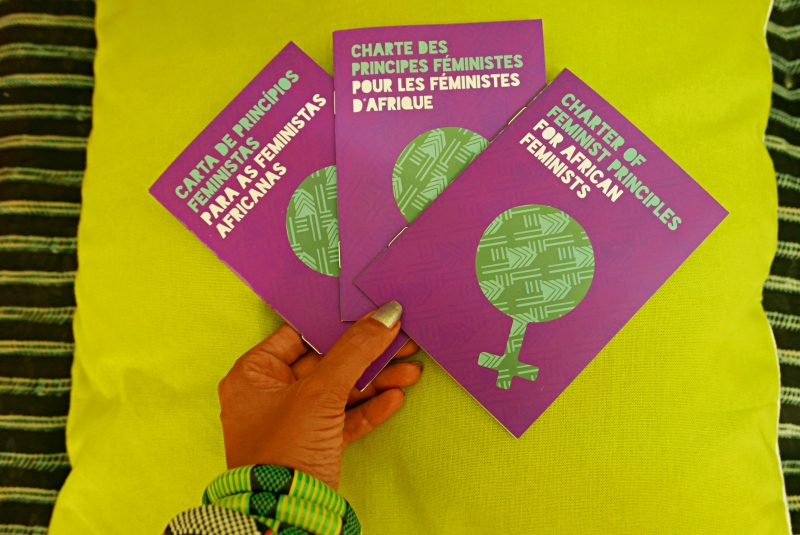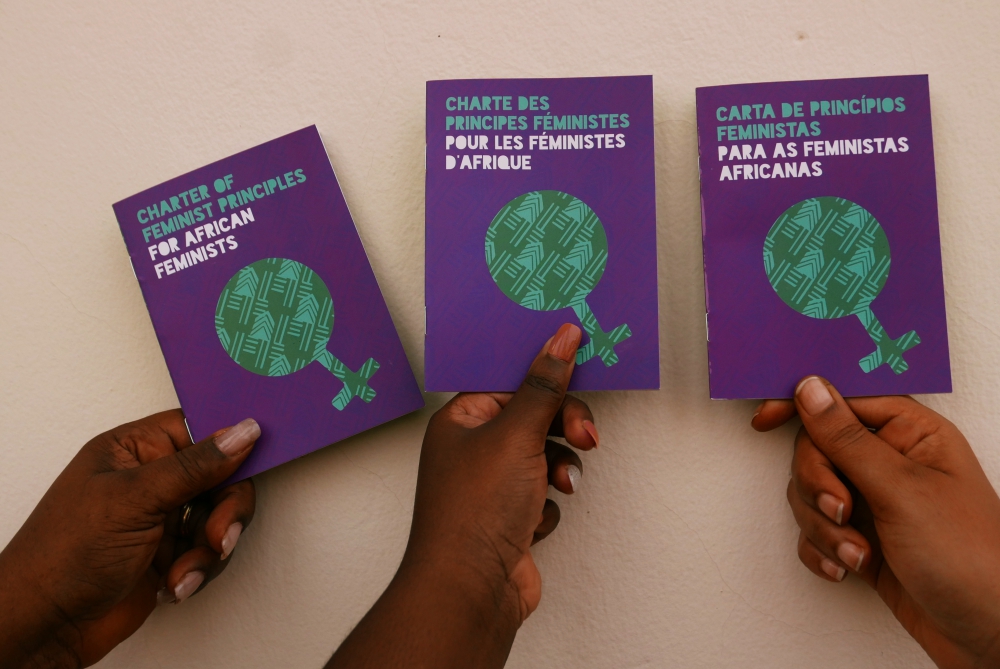Solidarity in word and deed: Translating the African Feminist Charter

Author: Jessica Horn, AWDF Director of Programmes
It may seem odd to be excited about a publication. However the story of the translation of the Charter of Feminist Principles for African Feminists begs recounting as a tale of inspired collective action.
The Charter itself was developed by the African Feminist Forum Working Group in 2006 and adopted in by over 100 African feminists at the first African Feminist Forum (AFF) hosted by AWDF in Accra that year. The goal was political clarity. Every movement needs to articulate its visions of ethics and collective power-and its political bottom lines. The Charter provided this, and has been used since as a means of bringing feminist activists across generations together to build feminist consciousness, create new feminist spaces and even to help unite women mobilising against religious fundamentalism.
As beautiful as it is, the Charter was written in English- a language spoken by some but not all of Africa’s people. Translating the Charter was imperative. However as is typical in the world of women’s organising, the AFF faced the challenge of funding. What we had not anticipated was the spontaneous action and love that we would receive in the form of voluntary translation by African activists so moved by the Charter that they saw it necessary to make sure the people they organised alongside could read it too.
In its first incarnation, Beninoise feminist and AWDF staff member Rissi Asani-Alabi translated the Charter into French for use in the bilingual AFF regional forums and to aid the creation of national Feminist Forums in Francophone African countries. Using this, Senegalese feminists Fatim Faye and Kura Saar went on to translate the Charter into Wolof, a language spoken widely in Senegal and Gambia. In the revised version additional translation support was offered by Pathé Diagne, one of Africa’s leading linguists and political scientists (who has, notably, also translated the Quran into Wolof).
In Tanzania, staff of the country’s leading women’s rights organisation Tanzania Gender Networking Programme translated the Charter into Kiswahili, opening up readership in Central and East Africa and offering feminist discourse in Kiswahili including the term feminism itself and a translation of the concept of ‘patriarchy’ (mfumo dume).
And the feminist love has continued to flow.
On reading the Charter for the first time, Egyptian women’s human rights defender Yara Salaam offered, in typical generous style, to translate the text into Arabic. Her father, poet and translator Refaat Sallam provided proofreading support, making the Charter accessible now to Arabic-speaking feminists across north and northeast Africa and to African feminists in Arabic speaking diasporas.
After returning from the 4th African Feminist Forum in Zimbabwe in early 2016, Angolan feminists Sizaltina Cutaia and Âurea Mouzinho were inspired to revive feminist organising by creating the Ondjango Feminista in their home country. Their first step, working with Florita Telo, was to translate the Charter into Portuguese to allow women in Angola to read and rekindle feminist activism. Through this solidarity, Portuguese translations of the Charters are already in the hands of feminist activists in Angola, Mozambique and Brazil- including with two of Brazil’s ground-breaking women capoeira masters.
This year we have worked with East African feminist graphic designer Lulu Kitololo to create a stunning new redesign of the Charter, producing versions in all of the languages available thus far. For Latin script we used title fonts created by The League of Moveable Type, a self-named leader in the open source font revolution, offering highly designed free fonts. In Arabic, Yara Salaam suggested use of the Amiri font- an open source font project design to revive and digitise an older Arabic typeface.
We often think of solidarity as large public displays. However there is solidarity in these quieter acts of resourcing a movement through knowledge, skills and time. Feminism is not just in the saying, it is in the doing. The process of redesigning and translating the Charter of Feminist Principles has proved that.
Our heartfelt thank you goes to everyone who has participated in making the Charter relevant and accessible to the widest possible audience. We hope you find the new materials useful. And as always, do let us know how you are using them
Download the charter for free:
English
Français
Português
Wolof
Kiswahili
Arabic
http://africlub.net/awdf/wp-content/uploads/Charter_of_Feminist_Principles_for_African_Feminists.pdf
